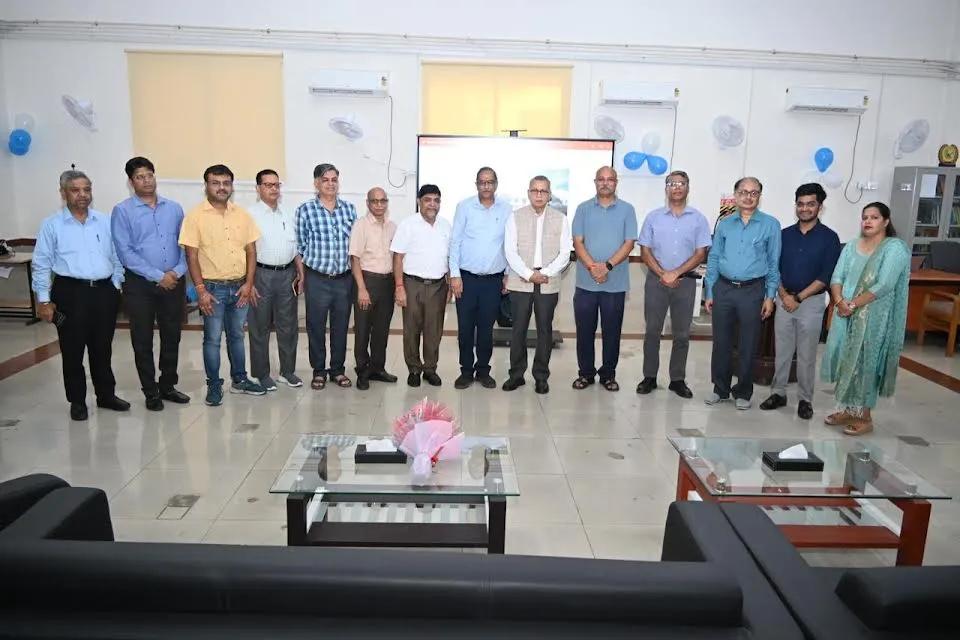Roorkee (The Hawk): From 8:00 am to 6:00 pm, the Indian Institute of Technology Roorkee (IIT Roorkee) observed a no petrol-diesel (fossil fuels) vehicle policy on campus. It promoted sustainable means of commuting on campus. It is well established that humans emit carbon through various activities, including fossil fuel (e.g. petrol, diesel etc.) based on vehicle usage. Carbon emission leads to global warming and climate change. One of the most important things that needs to be done is reducing human carbon emissions. This event is a powerful reminder of the urgent need to transition to eco-friendly transport options and reduce our reliance on fossil fuel-based vehicles.
If we do simple math to calculate carbon emission from 500four-wheelers cars commuting an average distance of 5 km daily on campus, in that case, we find they emit 450 kg of CO2 based on the NITI AAYOG CO2 Emission Calculator. This is equivalent to 217 kg of coal burning every day. Similarly, 2000 two-wheelers (e.g. scooters, motorbikes) emit 390 kg of CO2 daily, equal to 190 kilograms of coal burning. These are staggering numbers. The Institute Green Committee and ECO Group IIT Roorkee initiated and planned this event to raise awareness about the impact of fossil-fuel-based vehicles on the environment. Their vision and efforts reflect a deep commitment to creating a greener future for the entire IIT Roorkee community and beyond. During this particular day, each individual of the IITR fraternity opted for sustainable modes of transportation such as walking, cycling, and using e-rickshaws. Based on feedback and experience from this exercise, IIT Roorkee plans to modify its policies and infrastructure to allow for the transition to sustainable modes of commuting regularly.
IIT Roorkee has taken many such initiatives for a sustainable future. For instance, IIT Roorkee has also completed installing solar panels on the campus to solve the energy crisis. Faculty and students led initiatives to save significant electricity by conducting an energy audit and developing policies for reducing electricity consumption and energy conservation. Using Solar PV for electricity generation and Solar Thermal for cooking and water heating covering the entire campus is an iconic initiative the faculty and students undertake for maximum energy utilisation at the Institute. All the systems have sensors installed to check the optimal performance of installations and generate data for further research in these areas.
More Green Initiatives are being planned for wastewater recycling and recycling and rainwater harvesting in a decentralized manner. The IITR community is moving toward the segregation of waste at source, with plans to build a bio methanation unit to generate energy from the waste.
As per international norms and standards on sustainable progress, IIT Roorkee aims to strike a balance between human development and environmental protection and is thus “a promise to the present and a bequest to future generations.” As a result, the sustainable development principle aims to achieve three primary objectives: Social Sustainability, Environmental Sustainability, Economic Sustainability
Thanking all faculty members, staff and family residents, and outside campus visitors for providing their full support on a Carbon-neutral and Air Pollution Free Campus and making it green and sustainable, Prof K K Pant, Director, IIT Roorkee, highlighted, "The petrol-diesel vehicle-free campus for a day at IITR is a powerful symbol of our commitment to sustainable living. Our collective efforts to leave our cars behind, even for one day, help us take a small but significant step towards combating climate change and safeguarding the planet for future generations. Moreover, reducing the number of vehicles on campus will positively impact the overall campus environment, creating a more serene and pedestrian-friendly atmosphere."
Prof. Arun Kumar, Department of Hydro and Renewable Energy and Convenor of the Green Committee, IIT Roorkee, said, "IIT Roorkee's pioneering effort in observing this initiative and hope may become a regular feature on campus, and this event can set an example for other institutions, businesses, and communities to embrace sustainable transportation practices. It is a call to action for us to reconsider our transportation choices and explore sustainable alternatives."
A student, Harshit Depan, 2nd Year BTech Civil Engineering Department, said, "Green initiatives like these promote a sustainable environment in the college campus and impact students' lives positively daily. Studies have shown that students studying in active green campuses have better knowledge retention capacity, environmental behaviours, and community solidarity."

